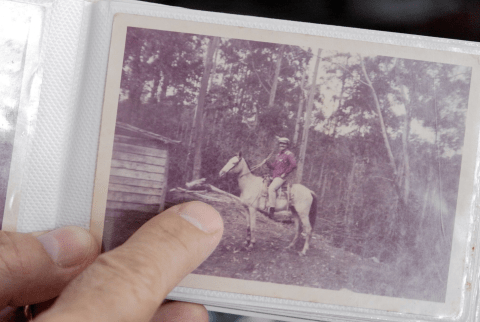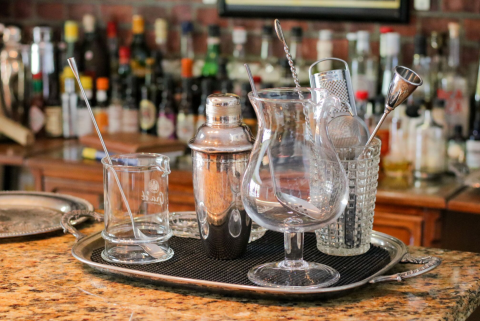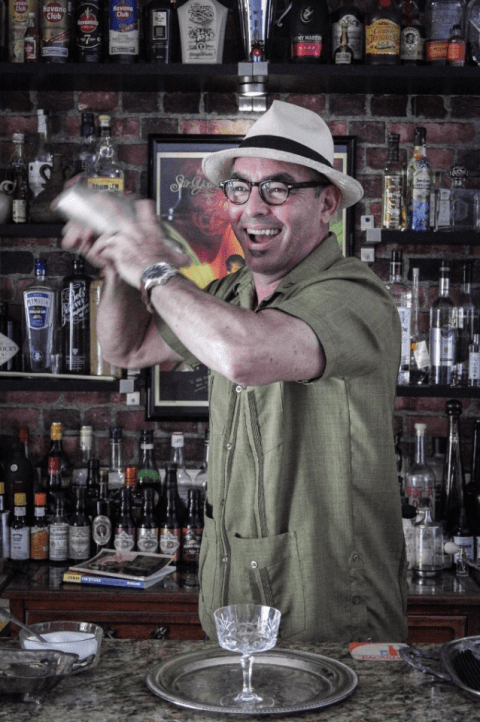Julio Cabrera opens the front door of his Miami Lakes home donning a guayabera and with a cigar in hand. Flushed with Cuban pride, he walks us to his cherry red 1955 Chevy Truck — that he mostly restored himself.
“I call him El Daiquiri.” he says, the corners of his mouth turning up while pointing to a vintage bag of sugar in the small backseat and fully functional bar area that he designed. “I needed to present my cocktails to the guest in a unique way”

This is the spirit of Julio Cabrera, who has and always will be a “Cantinero” for the people. Forget the fact that his bartending is one-of-a-kind and second-to-none (landing him on the cover of GQ); it is his perseverance and love for his family and for the craft bar that make him one of best bartenders in the world and a imminent legend, and this is his story.

Born in Calimete, Matanzas de Cuba in 1964 to a hospitality family, Cabrera’s father (who was lovingly known as Israel) owned El Sacrificio (The Sacrifice), a bakery and bar serving rum, wine and beer until Castro’s revolution when it was confiscated and eventually closed. “My father encouraged me to become an engineer or a doctor,” he recalls.

Instead of his footsteps, Julio followed his Father’s wishes and became an Agricultural Engineer in 1986. Little did he know that doing so would serendipitously lead him back to school, to study hospitality after a job in a coffee plantation in the mountains and another specializing in sugar cane and citrus. Upon graduating, Cabrera landed at one Cuba’s best hotels, Hotel Internacional, where he was introduced to the “art of the Cantinero.” Cabrera recalls, “being behind the bar, with the music and showmanship, I knew I was at home.”

In spite of feeling at home and winning his first national competition, the Havana Club Grand Prix (in 1992), Cabrera packed his bar tools for Italy after being asked to represent Havana Club. It was here that he learned and mastered style and technique from his Italian Cantinero counterparts.
“The Cantinero way is not about the cocktail you make,” he says. “It’s about how you make it and what the guest sees.”
After a four-year stint in Italy, Cabrera returned to Cuba where he continued to hone his craft as an active member of “El Club de Cantineros de Cuba,” the oldest bartenders guild in the world. In 2002, he became the first Cuban to compete in the IBA (International Bartender Association) World Championship. But it wasn’t long before his talent and thirst for knowledge outgrew the available resources in Cuba, and as conditions worsened, he knew he had to make a move.

“Mexico provided me with work and was a good place for my wife and son,” he says. There was only one problem: Cabrera was too “overqualified” to be a bartender, leading him to take on a bar manager role at the brand new Fiesta Americana Grand Aqua where as fate would have it, James Beard Award-winning Chef Michelle Bernstein and restaurateur David Martinez were opening a restaurant. “We began using local ingredients at the bar.”
The success and relationship was short-lived as Hurricane Wilma barreled through Cancun destroying the hotel and everything in its path, and with Michelle and David departing for Miami. “They told me if I ever made it to the United States they would have a job for me.” Of course Cabrera didn’t think anything of it at the time, but a few F&B manager gigs and hotels later —and with his yearning for being behind the bar growing stronger,—Cabrera set his eyes on the states after getting word from a co-worker that Bernstein and Martinez were opening the now late and famed Michy’s in Miami.
“I remembered what Michelle and David told me and made plans to make it into the United States. “
By plans he means crossing the border with two suitcases — one filled with his enough clothes for him and his family and the other with his bar tools. What he didn’t plan on, however, was to be detained by immigration police and harassed for his life savings. He gave it all up — except for $50 to feed their children and his luggage (the one filled with his Italian bar tools) — in exchange for American soil and asylum. “I’ve never looked back,” he says. “And I still have and use those tools daily.”

Upon arriving in the Magic City, Cabrera found temporary shelter (the floor of a friend’s home) for 45 days and contacted Martinez in order to take them up on their offer. Sure Michy’s had a beer & wine license but that didn’t stop Bernstein and Martinez from immediately hiring him as a bartender, or Cabrera from creating off-the-cuff and spirit-free cocktails like a bubbly mojito. With a keen eye for talent and a personal invitation to attend the Bar 5 Day Certification Program (the world’s most comprehensive distilled spirits and mixology course), Martinez extended the offer to Cabrera. “Bar 5 Day put me on another level.” To get an idea of the caliber of talent the course breeds, let’s just say that some of the country’s top cocktail minds (think Joaquín Simó, Ricky Gomez and Charles Joly) were his classmates.
2011 marked a turning point in Cabrera’s career when Martinez and Bernstein opened the formerly beloved Sra. Martinez and Esquire named it the “Best Bar in America.” Not only was he at the helm of the bar program at Sra. Martinez, but it’s where Cabrera conceived his famed and legendary Buenavista cocktail, and in many ways, came to be known as the heyday of Miami’s cocktail culture and still remembered as one of the city’s first mixology bars.

That same year Cabrera won the 2011 Don Q National Competition. In 2012, it was the Disaronno Mixing Star , and in 2013, Bombay Sapphire’s Most Imaginative Bartender in the United States, which subsequently landed him a on the rotating cover of a special edition of GQ. .
Fast-forward to today, Cabrera has been behind the cocktail programs of The Regent Cocktail Club and Ball & Chain and consulted on bars around the world. He’s trained bartenders in the Cantinero technique and taken them through Cuba for a once-in-a-lifetime journey of La Isla through his eyes.
“I like to bring American bartenders to Cuba.” he says. “For many years Cuban cocktail culture was denied and I found a way to bring some of the best in the world for professional and educational purposes. My goal is to bring the Cantinero spirit to American bartenders.”
Safe to say Cabrera has achieved the American dream…one daiquiri at a time. So if you see “El Daiquiri” around town, be sure to step into Cabrera’s backseat bar and join him for a drink.
Note: A shortened version (and the original) is available at Edible South Florida’s website, here.
